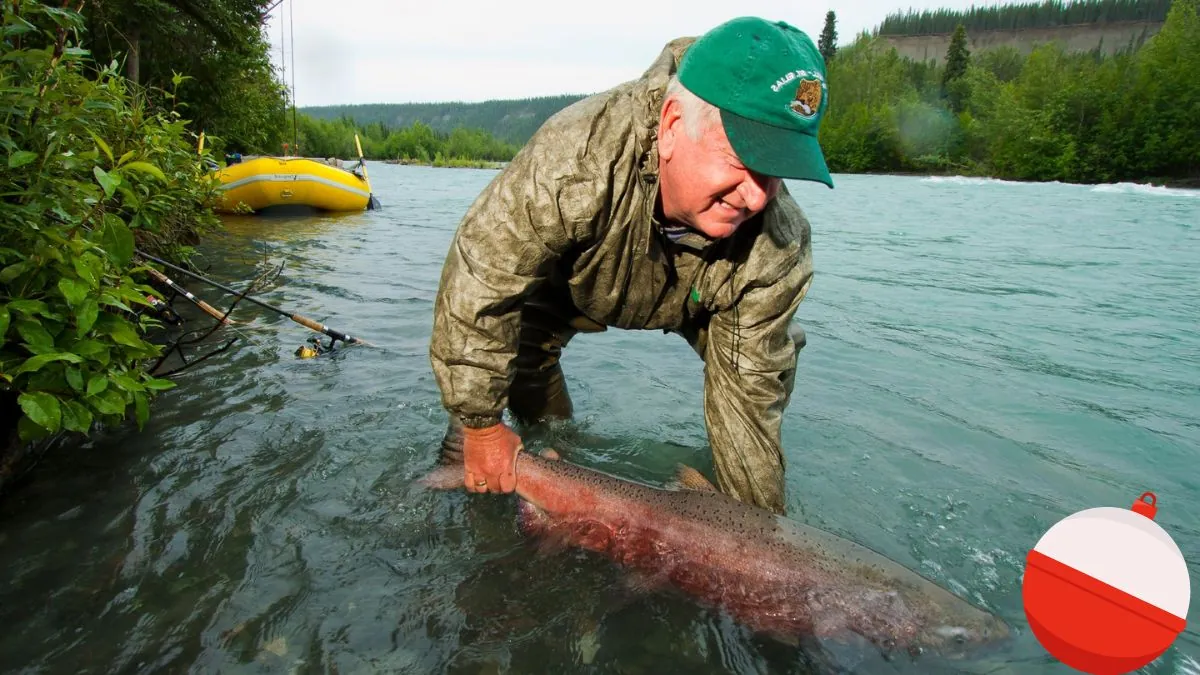Alaska, often referred to as “The Last Frontier,” is renowned for its pristine wilderness, abundant wildlife, and world-class fishing opportunities. For many seniors, fishing in Alaska represents not just a hobby but a cherished way to connect with nature and enjoy the state’s breathtaking landscapes. However, like all other states, Alaska requires anglers to obtain a fishing license. This article explores everything seniors need to know about obtaining a fishing license in Alaska in 2024, covering the types of licenses available, costs, exemptions, regulations, and tips for making the most of your Alaskan fishing experience.
Overview of Alaska’s Fishing Opportunities
Alaska’s diverse ecosystems provide a wide range of fishing opportunities, from the icy waters of the Bering Sea to the salmon-rich rivers of the Kenai Peninsula. The state’s vast coastlines, more than 3 million lakes, and numerous rivers make it a haven for anglers of all skill levels.
- Types of Fish: Alaska is home to various fish species, including five types of salmon (King, Sockeye, Coho, Pink, and Chum), halibut, trout, and Arctic char. The state’s waters also support species like northern pike, grayling, and rockfish.
- Popular Fishing Destinations:
- Kenai River: Known for its King Salmon, the Kenai River is a favorite among anglers.
- Bristol Bay: This region is famous for its Sockeye Salmon, particularly during the summer runs.
- Homer: Often called the “Halibut Capital of the World,” Homer attracts thousands of anglers each year.
- Kodiak Island: Offers diverse fishing opportunities, from salmon to halibut, in both saltwater and freshwater settings.
Who Needs a Fishing License in Alaska?
In Alaska, all anglers aged 16 and older are required to have a fishing license. This includes both residents and non-residents. However, there are special provisions and discounts available for senior residents.
- Definition of Senior Resident: In Alaska, a senior resident is defined as a person who is 60 years of age or older and has resided in Alaska for at least one year prior to applying for a license.
Types of Fishing Licenses Available for Seniors in 2024
For senior residents of Alaska, there are several types of fishing licenses available, catering to different needs and preferences.
- Sport Fishing License: This is the standard license for recreational fishing in both saltwater and freshwater.
- Cost for Seniors: Free for residents aged 60 and older who have been residents for at least one year.
- King Salmon Stamp: Required for those fishing for King Salmon.
- Cost for Seniors: Also free for eligible senior residents.
- Special Use Permits: Certain areas may require additional permits, such as those for fishing in specific conservation areas or on Native Alaskan lands.
- Cost: Varies depending on the location and type of permit required.
How to Obtain a Fishing License
Obtaining a fishing license in Alaska is a straightforward process. Seniors can apply for a license online, by mail, or in person at various locations.
- Online Application: The Alaska Department of Fish and Game (ADF&G) offers an easy-to-use online portal for purchasing fishing licenses. Seniors can create an account, provide proof of residency, and download their license immediately after approval.
- In-Person Application: Licenses can be obtained at ADF&G offices, sporting goods stores, and some local government offices. Cities like Anchorage, Fairbanks, and Juneau have several locations where seniors can apply for a license.
- Mail-In Application: Seniors can also apply by mail by sending a completed application form to the ADF&G office. This method may take longer, so it is advisable to apply well in advance of the planned fishing trip.
Exemptions and Special Provisions for Seniors
Alaska offers several exemptions and special provisions for seniors, recognizing their long-standing contributions to the state’s community.
- Lifetime Licenses: Seniors who meet the residency requirement can apply for a lifetime fishing license, ensuring they never have to renew their license annually.
- Cost: Free for eligible senior residents.
- Subsistence Fishing: Senior residents who are Alaska Natives or live in rural areas may be eligible for subsistence fishing, which allows them to fish without a sport fishing license for personal use.
- Eligibility: Requires proof of residency in a qualifying rural area or Native Alaskan heritage.
- Veterans and Disabled Seniors: Disabled veterans or seniors with disabilities may qualify for additional exemptions, allowing them to fish without a standard sport fishing license.
- Cost: Free with proof of disability or veteran status.
Fishing Regulations for Seniors
While obtaining a fishing license is the first step, it is crucial for seniors to be aware of the fishing regulations in Alaska to ensure a lawful and enjoyable experience.
- Bag and Possession Limits: These limits vary by species and location. For example, the bag limit for King Salmon in the Kenai River is generally one fish per day, with a possession limit of two.
- Catch-and-Release Rules: Some areas have strict catch-and-release rules, particularly for King Salmon. Seniors should check local regulations before fishing.
- Seasonal Restrictions: Certain fish species have specific seasons. For instance, the halibut season typically runs from May to September, while salmon runs vary by region and species.
- Gear Restrictions: In some areas, there are restrictions on the type of gear that can be used, such as single-hook lures or barbless hooks.
- Reporting Requirements: Seniors who catch certain species, such as King Salmon, may be required to report their catch to the ADF&G.
Tips for Seniors Planning a Fishing Trip in Alaska
Planning a fishing trip in Alaska requires careful preparation, especially for seniors. Here are some tips to help ensure a safe and enjoyable experience:
- Weather Considerations: Alaska’s weather can be unpredictable. Seniors should pack appropriate clothing for varying conditions, including rain gear, warm layers, and sun protection.
- Physical Preparedness: Fishing in Alaska can be physically demanding, especially in remote areas. Seniors should assess their physical condition and consider hiring a guide or choosing less strenuous fishing locations if needed.
- Safety Precautions: Always inform someone of your fishing plans, especially if venturing into remote areas. Carry a first-aid kit, bear spray, and a satellite phone or emergency beacon in case of emergencies.
- Choosing the Right Location: Depending on physical ability and fishing preferences, seniors can choose from a variety of locations, from accessible rivers near major cities like Anchorage to more remote and secluded spots in the Alaskan wilderness.
Economic and Cultural Impact of Senior Fishing in Alaska
Fishing is not just a recreational activity in Alaska; it is a significant contributor to the state’s economy and cultural heritage.
- Economic Contributions: The fishing industry, including sport fishing, contributes billions of dollars to Alaska’s economy each year. Senior anglers play a vital role in this, as they often participate in guided tours, lodge stays, and fishing charters.
- Statistics: In 2023, Alaska’s sport fishing industry generated approximately $1.4 billion, with seniors accounting for nearly 20% of all anglers.
- Cultural Significance: For many Alaskan seniors, fishing is a deeply rooted tradition passed down through generations. It serves as a way to connect with the state’s natural resources and maintain a sense of community.
Environmental Considerations and Conservation Efforts
Conservation is a critical aspect of fishing in Alaska, ensuring that the state’s fish populations remain healthy for future generations.
- Sustainable Fishing Practices: Seniors are encouraged to practice catch-and-release for species that are not intended for consumption, use environmentally friendly gear, and follow all local regulations to minimize their impact on fish populations.
- Conservation Programs: The ADF&G offers several programs aimed at conserving fish habitats and populations, such as the Salmon Conservation Stamp Program. Seniors can contribute to these efforts by purchasing conservation stamps or volunteering in local conservation projects.
Resources for Seniors
Several resources are available to help seniors plan and enjoy their fishing experiences in Alaska.
- Alaska Department of Fish and Game: The ADF&G website offers comprehensive information on fishing regulations, license applications, and conservation programs.
- Website: www.adfg.alaska.gov
- Local Fishing Guides: Hiring a local guide can enhance the fishing experience, particularly for those unfamiliar with Alaska’s waters. Many guides offer senior discounts.
- Community Programs: Some communities offer fishing programs specifically for seniors, providing opportunities to learn new skills, socialize, and participate in group fishing trips.
Conclusion
Fishing in Alaska is a rewarding experience that offers seniors the opportunity to enjoy the state’s natural beauty while engaging in a beloved pastime. With the appropriate license, awareness of local regulations, and proper planning, seniors can make the most of their fishing adventures in 2024. Whether you are a lifelong Alaskan or a recent resident, the state’s bountiful waters and majestic landscapes provide the perfect backdrop for a memorable fishing experience.
Alaska’s commitment to providing free fishing licenses for senior residents demonstrates the state’s recognition of the importance of outdoor recreation in maintaining the health and well-being of its aging population. So grab your gear, secure your license, and head out to explore the incredible fishing opportunities that await you in the Last Frontier.
This Article Includes
- 1 Overview of Alaska’s Fishing Opportunities
- 2 Who Needs a Fishing License in Alaska?
- 3 Types of Fishing Licenses Available for Seniors in 2024
- 4 How to Obtain a Fishing License
- 5 Exemptions and Special Provisions for Seniors
- 6 Fishing Regulations for Seniors
- 7 Tips for Seniors Planning a Fishing Trip in Alaska
- 8 Economic and Cultural Impact of Senior Fishing in Alaska
- 9 Environmental Considerations and Conservation Efforts
- 10 Resources for Seniors
- 11 Conclusion







